Skin Conditions: Quick Facts, Common Issues & How to Manage Them
If you’ve ever stared at a red patch, an itchy bump, or stubborn acne, you know skin problems can be frustrating. The good news is most skin conditions are predictable and often treatable with the right approach. Below you’ll find straight‑forward info on what’s causing those spots and practical steps to keep your skin feeling comfortable.
Common Skin Problems You Might Recognize
Acne and bacterial breakouts: Doxycycline, a low‑dose antibiotic, is frequently prescribed for moderate acne because it reduces the bacteria that fuel inflammation. If you’re buying doxycycline online, make sure the pharmacy is legit and you have a prescription – safety first.
Eczema and dry patches: These often flare up when skin loses moisture or when irritants hit it. Simple moisturizers with ceramides work best right after a shower while your skin is still damp.
Scabies: Tiny mites burrow under the skin, causing intense itching. A prescription cream like Elimite (permethrin) kills the mites in one application. Follow the label carefully and wash all bedding to avoid reinfestation.
Psoriasis: This autoimmune condition shows up as thick, silvery scales. Topical steroids or vitamin D analogues can calm flare‑ups; severe cases may need oral meds like methotrexate under doctor supervision.
Contact dermatitis: Direct contact with an allergen (nickel, fragrances) triggers redness and swelling. Identify the trigger, avoid it, and use over‑the‑counter hydrocortisone for quick relief.
Practical Tips for Treating and Preventing Flare‑Ups
First, keep a simple skin diary. Note what you eat, new products, stress levels, and any rash that appears. Patterns often emerge – maybe a certain soap or a stressful workweek is the culprit.
Second, protect your barrier. Gentle cleansers (no sulfates), lukewarm water, and a daily moisturizer lock in hydration without stripping natural oils.
If you need medication, use reputable sources. Websites like MenMD.com list safe buying guides for antibiotics, antihistamines, or prescription creams. Always have a valid prescription and verify the pharmacy’s licensing before checkout.
Third, don’t ignore persistent symptoms. A rash that lasts more than two weeks, spreads quickly, or hurts when touched should be evaluated by a dermatologist. Early diagnosis can prevent complications and reduce treatment time.
Finally, lifestyle matters. Stay hydrated, eat a balanced diet rich in omega‑3 fatty acids (think fish, flaxseed), and manage stress with short walks or breathing exercises. These habits support skin health from the inside out.
Whether you’re dealing with occasional acne or chronic eczema, knowing the cause and having a clear action plan makes a huge difference. Use the tips above, check reliable sources for medication guidance, and reach out to a healthcare professional when needed. Your skin will thank you.
The Connection Between Skin Conditions and Other Health Issues
Well folks, buckle up because we're about to dive into the fascinating world of skin conditions. It turns out, your skin is like your body's billboard, broadcasting messages about your overall health. Some skin issues are like cheeky little spies, hinting at possible problems in other parts of your body. From the zit that suggests you need to cut back on the chocolate, to more serious conditions like psoriasis that may be linked to heart disease, your skin tells a story. So, next time you see something odd popping up on your skin, don't just shrug it off; it might be your body's version of a billboard saying "Hey buddy, something's up!"
© 2026. All rights reserved.

